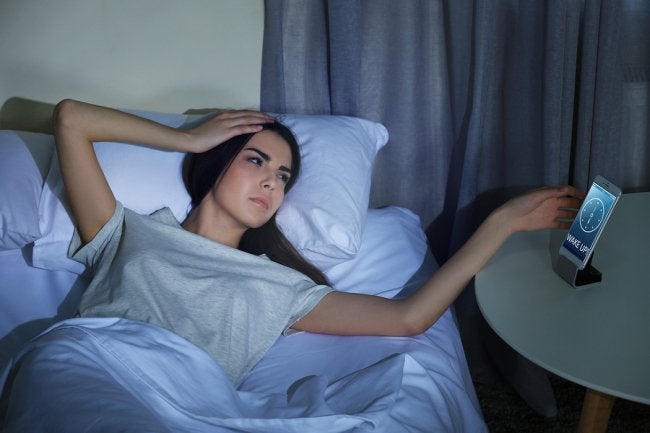-
Getting the Facts About Nocturia

Do you find yourself frequently waking up during the night to go to the bathroom? You could have a problem known as nocturia, which is characterized by the disruption of the normal sleep cycle due to the need to urinate more than once during the night. This urology issue can lead to other health problems associated with chronic sleep deprivation. Fortunately, a urologist can determine the underlying causes and recommend appropriate treatment options.
Causes
Some of the potential causes of nocturia are sex-specific. Women may suffer from nocturia because of childbirth, menopause, or pelvic organ prolapse (POP). Men may develop this problem because of benign prostatic hyperplasia (BPH) or an enlarged prostate. The causes that could affect a patient of either sex include the excessive use of caffeine or alcohol, or drinking any fluids to excess before bedtime. Uncontrolled diabetes, diuretic medications, sleeping disorders, and bladder inflammation are other possible causes. Some patients may have low nocturnal bladder capacity due to interstitial cystitis, bladder obstruction, or recurrent urinary tract infections (UTIs).
Diagnostics
When you visit a urologist to discuss your symptoms, they may ask you to keep a fluid and voiding record for a few days. You’ll make notes about the time and amount of your fluid intake, medication usage, caffeine and alcohol usage, and voiding behaviors. The urologist might also request medical tests such as a urinalysis.
Treatments
Treating nocturia may involve a combination of medical interventions and lifestyle changes . Your doctor might recommend medications to help you manage your symptoms. If you have an underlying medical condition that is causing nocturia, then treating this medical condition can help relieve your symptoms. You might also consider making lifestyle changes, such as limiting your fluid intake in the evening and adjusting your schedule of diuretic medications. You might also consider taking naps in the afternoon, wearing compression stockings, and elevating your legs.
Urology Associates, P.C. connects patients with urology issues with effective treatment options to improve quality of life. Nocturia, incontinence, and sexual dysfunction are just a few of the conditions we treat. Call (855) 901-1338 to set up an appointment with our urology team in Tenenssee.
-
What Are the Causes of Bladder Infections?
Urinary tract infections or bladder infections can cause uncomfortable symptoms like burning sensations during urination. If you suffer from recurrent urinary tract infections, it may be time to visit a urologist to discuss an effective UTI treatment plan.
Watch this animation to find out about the possible causes of UTIs. You’ll learn why women tend to get them more frequently than men. You’ll also discover that pregnancy, menopause, diabetes, certain birth defects, and bladder or kidney stones can all contribute to bladder infections. This animation offers some helpful tips for preventing future UTIs.
You’ll find compassionate providers and effective treatment options at Urology Associates, P.C. if you suffer from a UTI and you live in Tennessee, give us a call at (855) 901-1338.
-
Exploring the Causes, Symptoms, and Treatments of Vaginal Atrophy

Vaginal atrophy, also referred to as atrophic vaginitis, is a sexual health problem that occurs in response to changing hormone levels. This condition is characterized by the thinning and drying out of the vaginal walls. These vaginal walls also become inflamed. If you suspect you may be suffering from this type of sexual dysfunction, consider requesting a referral to a urologist.
Symptoms
Women with vaginal atrophy typically experience symptoms such as painful sexual intercourse, reduced vaginal lubrication, and light bleeding following sexual intercourse. Some women may also notice genital itching, unusual vaginal discharge, vaginal dryness and burning, and more frequent urinary tract infections. Urinary symptoms of vaginal atrophy can include frequent and urgent urination, burning with urination, and urinary incontinence.
Causes
The vaginal tissues need a steady supply of estrogen, a hormone, to keep the vaginal walls elastic and robust. Vaginal atrophy occurs when the body no longer produces enough estrogen. This change is associated with menopause, although women may also suffer from vaginal atrophy because of breastfeeding. Other possible causes include pelvic radiation therapy, chemotherapy, surgical menopause, and hormonal treatment for breast cancer. Some factors may increase the risk that a woman will develop vaginal atrophy. These include the lack of sexual activity, since sexual activity increases blood flow to the area and encourages elasticity of the vaginal tissues. Smoking can also increase the risk, as can never having given birth vaginally.
Treatments
Women with mild vaginal atrophy may benefit from the application of certain products designed to restore vaginal lubrication. Other women might consider hormone replacement therapy (HRT). Some urology centers may offer advanced technology to treat vaginal atrophy, such as the MonaLisa Touch laser therapy system. Many women undergoing laser therapy enjoy significant improvements in their symptoms in just three short sessions.
The Women’s Institute for Sexual Health (WISH) at Urology Associates, P.C. provides confidential, sensitive care to women with sexual dysfunction in Tennessee. Our providers rely on the latest research and medical technology to diagnose and treat sexual health issues for women. Call us at (855) 901-1338 to request a confidential consultation.
-
What Causes Urethral Strictures?

Men who suffer from bloody or dark urine, bloody semen, loss of bladder control, and swelling of the penis might visit a urologist to confirm a diagnosis of urethral strictures. A urethral stricture occurs when the urethra becomes abnormally narrowed. This is the tube that transports urine from the bladder out of the body. The primary underlying causes of urethral strictures are the inflammation or accumulation of scar tissue in the area.
A urethra may be subjected to scar tissue build-up or inflammation because of a traumatic injury or surgical procedure performed in the area. This problem might also be the result of a disease. It is rare, though possible, to have congenital urethral strictures. Some factors can increase the risk of urethral strictures, including benign prostatic hyperplasia (BPH), recurrent urethritis, pelvic injuries, and sexually transmitted infections (STIs).
For compassionate urology care in Tennessee, men and women can turn to Urology Associates, P.C. Call (855) 901-1338 or visit us online to view a list of conditions our urology team can treat , including sexual dysfunction and testicular cancer.
-
Signs You Should Talk to Your Doctor About Urinary Incontinence

Often, patients who experience incontinence are hesitant to speak up about their concerns. This is typically because incontinence can be an embarrassing problem to discuss, and because patients might secretly hope that the problem simply goes away by itself. But it’s important to understand that there’s nothing shameful about urinary incontinence; it’s actually quite common among both men and women. A urologist can determine the cause of your incontinence and explain your treatment options. You may even feel a sense of relief as soon as you visit a urologist simply from knowing that your problem will be managed properly.
You Have Developed Acute Incontinence
Acute urinary incontinence is when urine leakage begins suddenly. Acute incontinence can be caused by a bladder infection or urinary retention caused by fecal impaction. Acute incontinence could also be a side effect of medications. Acute incontinence is typically easily correctible.
Your Symptoms Interfere with Your Daily Life
If you experience persistent urinary incontinence, then there’s a good chance that you’ve had to restructure your daily routine to accommodate your urine leakage. You might find yourself bringing several changes of clothes with you wherever you go, perhaps along with special underwear or sanitary pads. You might even find yourself limiting or eliminating your social activities for fear of leaking while out of the house. When your symptoms interfere with your daily life, it’s time to talk to a doctor .
You Avoid Sexual Intercourse
Sexual intercourse is a healthy component of intimate relationships, yet people with urinary incontinence often avoid it. This can even cause relationship problems, particularly when the partner with urinary incontinence is hesitant to disclose the real reason for sexual avoidance. A chat with a urologist can help clear the air.
Here at Urology Associates, P.C., it’s our mission to improve our patients’ quality of life. Our urology team throughout Tennessee treats all types of conditions pertaining to urologic and sexual health, including urinary incontinence. Take the first step toward reclaiming your quality of life by calling us at (855) 901-1338 and requesting an appointment.
Recent Posts
categories
- Uncategorized
- Bladder Cancer
- Women's Sexual Health
- MonaLisa Touch
- Urology
- Urologist
- Erectile Dysfunction
- Kidney Cancer
- Incontinence
- Prostate
- MonaLisa Touch Laser Treatment
- Kidney Stones
- Urinary Tract Infections
- Event
- Sexual Dysfunction
- Testicular Cancer
- Prostate Cancer
- Urology Surgery Center
- urinary incontinence
- vaginismus
- noncoital pain disorder
- Hypoactive Sexual Desire Disorder
- Infographic
- provenge
- Xofigo
- robotic surgery
- hormone replacement
- diabetes
- renal cell carcinoma
- pelvic pain
- hematuria
- sexual health
- chronic testicular pain
- premature ejaculation
- Men's Health Clinic
- Dr. Melvin Seard
- Interstitial Cystitis
- vasectomy
- overactive bladder
- vaginal atrophy
- nocturia
- bladder infections
- urethral strictures
- Acute Epididymitis
- low sex drive
- circumcision
- pelvic floor dysfunction
- Peyronie's Disease
- prostatitis
- female sexual dysfunction
- varicocele
- difficult urination
- low libido
- PSA levels
- male fertility
- penile prosthesis
- prostatic intraepithelial neoplasia
- male infertility
- estrogen levels
- nurse navigator
- stress urinary incontinence
- vaginal yeast infection
- elevated psa
- painful sex
- adult circumcision
- epididymitis
- OAB
- kidney infection
- penile cancer
- pelvic organ prolapse
- Vasectomy Reversal
- bone health
- cystectomies
- clinical trials
- bloody urine
- Advanced Therapeutic Center
- WISH MedSpa
- neurogenic bladder
- WISH Team
- prostate biopsies
- BPH
- fecal incontinence
- lithotripsy
- osteoporosis
- kidney cysts
